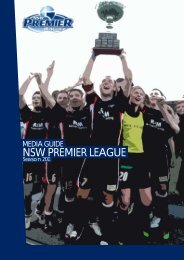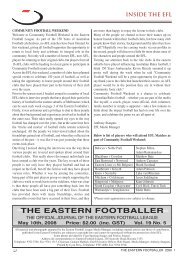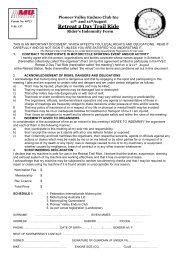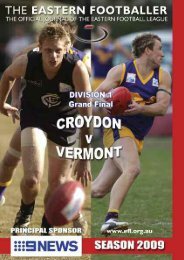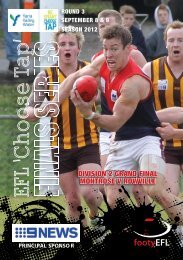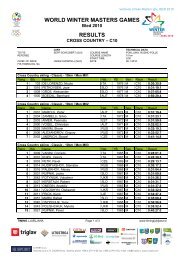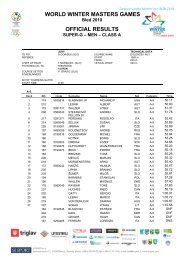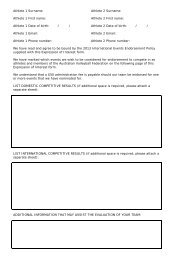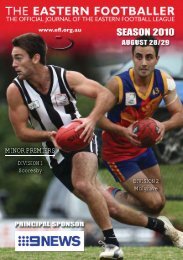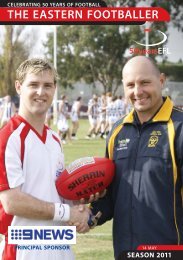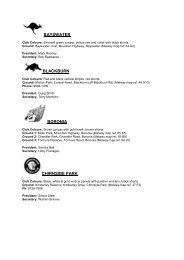World Masters Games 2017 Candidature Guidelines - SportingPulse
World Masters Games 2017 Candidature Guidelines - SportingPulse
World Masters Games 2017 Candidature Guidelines - SportingPulse
Create successful ePaper yourself
Turn your PDF publications into a flip-book with our unique Google optimized e-Paper software.
<strong>World</strong> <strong>Masters</strong> <strong>Games</strong> <strong>2017</strong><br />
<strong>Candidature</strong> <strong>Guidelines</strong>
1. Introduction ......................................................................................................................... 4<br />
2. Deadlines and landmarks .................................................................................................. 4<br />
3. The Fundamental Idea ........................................................................................................ 6<br />
3.1 What is a Master ............................................................................................6<br />
3.2 Who are the athletes at the <strong>World</strong> <strong>Masters</strong> <strong>Games</strong> ....................................6<br />
3.3 What is the <strong>World</strong> <strong>Masters</strong> <strong>Games</strong> ...............................................................7<br />
4. Why bid for the <strong>World</strong> <strong>Masters</strong> <strong>Games</strong> ............................................................................. 9<br />
4.1 The <strong>World</strong> <strong>Masters</strong> <strong>Games</strong> is a Major Sports Event ...................................9<br />
4.2 The <strong>World</strong> <strong>Masters</strong> <strong>Games</strong> is a major tourism event .................................9<br />
4.3 The <strong>Games</strong> are a major driver of visitation for your city and region ........9<br />
4.3.1 Visiting athletes stay for an extensive period of time ............................................. 10<br />
4.3.2 Athletes bring Family and friends with them .......................................................... 11<br />
4.3.3 Where do they stay ................................................................................................ 11<br />
4.3.4 Activities during the <strong>Games</strong> ................................................................................... 13<br />
4.4 Increase and strengthen the event knowledge of the city .......................14<br />
4.5 Strengthen relationships with the International <strong>World</strong> of Sport .............14<br />
4.6 No expenditure on new venues ..................................................................14<br />
4.7 No expenditure on event software .............................................................14<br />
4.8 Build a strong Sport for All legacy .............................................................14<br />
4.9 Media exposure ...........................................................................................15<br />
4.10 Boost community and regional ties ...........................................................15<br />
4.11 Athletes Database .......................................................................................15<br />
5. <strong>Guidelines</strong> and conditions ............................................................................................... 16<br />
6. The IMGA ........................................................................................................................... 16<br />
6.1 The IMGA board of governors ....................................................................16<br />
6.2 IMGA’s Obligations to the host city ...........................................................17<br />
6.3 IMGA responsibilities during <strong>World</strong> <strong>Masters</strong> <strong>Games</strong> ...............................17<br />
7. Athletes .............................................................................................................................. 18<br />
8. Host City ............................................................................................................................ 19<br />
8.1 Responsibilities of the Host City Organising Committee (HCOC) ..........19
8.2 Logistics .......................................................................................................19<br />
8.2.1 Accommodation & Transport ................................................................................. 20<br />
8.2.2 Registration Centre ................................................................................................ 21<br />
8.2.3 Activities ................................................................................................................. 22<br />
8.2.4 Media ..................................................................................................................... 24<br />
8.2.5 IT solution .............................................................................................................. 24<br />
8.2.6 Volunteers .............................................................................................................. 24<br />
8.2.7 Environment ........................................................................................................... 24<br />
8.3 Sports ...........................................................................................................25<br />
8.3.1 Competition ............................................................................................................ 25<br />
8.3.2 Sports organisation ................................................................................................ 25<br />
8.3.3 Competition Rules ................................................................................................. 26<br />
8.3.4 Officials .................................................................................................................. 27<br />
8.3.5 Venues ................................................................................................................... 27<br />
8.3.6 Results ................................................................................................................... 28<br />
8.3.7 Sports Guarantees ................................................................................................. 28<br />
8.4 Finances .......................................................................................................29<br />
8.4.1 Sponsorship ........................................................................................................... 29<br />
8.5 Marketing ......................................................................................................30<br />
8.6 Medical Coverage ........................................................................................31<br />
8.6.1 Doping .................................................................................................................... 31<br />
8.7 Further information in support of your bid ...............................................32<br />
9. Formal bid document content ......................................................................................... 33<br />
9.1 <strong>Candidature</strong> file ...........................................................................................33<br />
9.2 Guarantees ...................................................................................................33<br />
9.3 <strong>Candidature</strong> fee ...........................................................................................33<br />
9.4 Approval of host city Contract ...................................................................33<br />
9.5 Electronic format of documents .................................................................33<br />
Appendix 1 : <strong>Games</strong> Deliverables - Divisional Check list ..................................................... 34
1. Introduction<br />
As Candidate Cities, you are now in first phase of the process to designate the Host City of the 9 th<br />
<strong>World</strong> <strong>Masters</strong> <strong>Games</strong> in <strong>2017</strong>.<br />
The aim of this document is to guide you through the various steps of your candidature until the<br />
election of the Host City by Board of Governors of the International <strong>Masters</strong> <strong>Games</strong> Association<br />
(IMGA).<br />
The <strong>Candidature</strong> Procedure outlines what is required of a Candidate City, as well as the<br />
procedures, rules and deadlines to be respected during the various phases. Apart from essential<br />
information, it also contains many useful recommendations and should be considered as essential<br />
reading for anyone connected with the preparation and promotion of a candidature for the <strong>World</strong><br />
<strong>Masters</strong> <strong>Games</strong>.<br />
2. Deadlines and landmarks<br />
The bid document produced by the candidate cities by answering the bidding questionnaire, with<br />
the assistance of these guidelines, will be the basis for the first part of the evaluation. After the<br />
initial evaluation the Board of Governors reserves the right to reduce the number of candidates.<br />
The remaining candidates will then enter the second stage of the evaluation process where a small<br />
evaluation commission will visit the cities. This group will normally not exceed 3 persons and<br />
consists of IMGA governors, representatives of the international federations and members of the<br />
administration.<br />
The commission will evaluate, whether facilities and venues are satisfactory for an event of this<br />
magnitude. The commission will also meet with representatives from the sports and local<br />
government supporting the bid. An evaluation report will be distributed to the bid cities and The<br />
IMGA board of Governors.<br />
The Finalist cities will be given 20 Min to present their bid at the IMGA general assembly and 5 Min<br />
to answer questions from the international sports federations and the board.<br />
The selection of host city will subsequently to the evaluation report take place by the IMGA board<br />
of Governors.<br />
Please see Table next page for more detail on dates. Main deadlines and landmarks of the<br />
candidature procedure.<br />
4
Table 1 : Deadlines of the candidature procedure<br />
Object<br />
Deadline<br />
Submission of Official letter confirming candidature. * Thursday 8 th of September 2011<br />
Payment of candidature fee (EUR 30.000) **<br />
An invoice will be sent by email<br />
Submission of candidature file in electronic format to the<br />
IMGA *<br />
Thursday 10 th of November 2011<br />
Friday 10 th of February 2012<br />
Selection of finalist cities published Thursday 1 st of March 2012<br />
Visit by the IMGA evaluation commission and negotiation of<br />
host city contract.<br />
Presentation of bids by finalist cities at IMGA General<br />
Assembly in Quebec<br />
Submission of financial and sports guarantees to the IMGA<br />
as described in the Bidding Questionnaire<br />
Final selection of host for the <strong>2017</strong> <strong>World</strong> <strong>Masters</strong> <strong>Games</strong><br />
at IMGA Board Meeting held after the Annual General<br />
Assembly<br />
Signature of host city contract following selection of Host<br />
City<br />
Final day for payment of first instalment of rights fee for the<br />
<strong>2017</strong> <strong>World</strong> <strong>Masters</strong> <strong>Games</strong><br />
March, April and May 2012<br />
Monday 21 st of May 2012<br />
Monday 21 st of May 2012<br />
Monday 21 st of May 2012<br />
Monday 21 st of May 2012<br />
Friday 1 st of June 2012<br />
* All correspondenae must send to WMG<strong>2017</strong>@imga.ch Letter can be attached to email as<br />
image, pdf file or other electronic format.<br />
Should a host city also decide to send information by post, please use the following<br />
address:<br />
International <strong>Masters</strong> <strong>Games</strong> Association, Maison du Sport International<br />
Avenue de Rhodanie 54<br />
1007 Lausanne, Switzerland<br />
** This amount will cover the flights for the evaluation. EUR 28’000 will be returned if the city<br />
is not part of the evaluation. EUR 2’000 will be retained for administration costs.<br />
Please Contact IMGA for invoice and payment details.<br />
5
3. The Fundamental Idea<br />
In recent decades <strong>Masters</strong> sport has grown significantly at various levels: local, regional, national<br />
and international. The emphasis in <strong>Masters</strong> sport on participation and ‘sport for all’ has made it<br />
accessible to people of varying abilities and performance levels. For many of these athletes,<br />
<strong>Masters</strong> sport is as much a social occasion as a sport event—a chance to meet others with an<br />
interest in exercise for enjoyment, recreation and health promotion. <strong>Masters</strong> sport is also appealing<br />
to athletes with a more competitive ethos; performance excellence is recognised by the award of<br />
medals. <strong>Masters</strong> sport also attracts athletes who have retired from elite competition, but who<br />
welcome an opportunity to perform in a properly organised setting. <strong>Masters</strong> sport, one of the fastest<br />
growing areas of sports participation, will become even more important for community sport and<br />
health as the population ages. Unlike <strong>World</strong> Championships for veterans or masters, the <strong>World</strong><br />
<strong>Masters</strong> <strong>Games</strong> do not have qualification criteria for participation, other than the minimum age<br />
requirements. Such a wide range of participants and diverse patterns of involvement help to<br />
account why the <strong>World</strong> <strong>Masters</strong> <strong>Games</strong> is the largest sporting event, in terms of athlete numbers,<br />
on earth.<br />
3.1 What is a Master<br />
<strong>Masters</strong> sport is a generic term that encompasses veterans, golden oldies, legends, seniors and<br />
many other forms of mature-aged sport. In the context of <strong>World</strong> <strong>Masters</strong> <strong>Games</strong>, the term „Master“<br />
is applied to male and female competitors who comply with the International Sports Federations’<br />
rules regarding the minimum age in their respective sport, normally between 30 and 40 years. In<br />
the case where such minimum age has not been established, the Host City Organizing Committees<br />
and the IMGA may decide. Most <strong>Masters</strong>’ sports are furthermore organised in age categories of<br />
five or ten year intervals.<br />
Participants in <strong>Masters</strong> <strong>Games</strong> may be former <strong>World</strong> Champions or Olympians, national<br />
representatives, club athletes or social level sportspeople. They participate for a multitude of<br />
reasons, with the level of competition ranging from elite to social standard.<br />
3.2 Who are the athletes at the <strong>World</strong> <strong>Masters</strong> <strong>Games</strong><br />
There is a general misconception that <strong>Masters</strong> <strong>Games</strong> are for older and potentially retired people.<br />
Reality is however that the average age of participants is 49 mostly well educated at the height of<br />
their careers. They have a high average income and the vast majority are in a relationship and<br />
usually travel to the games with their family/partner.<br />
Please also note that IMGA pursues a goal of even genders distribution at our games which to a<br />
large degree has been achieved due active encouragement and promotion of female participation<br />
by the organising committees in the past.<br />
The charts below will give you a brief overlook of this data. It is however strongly encouraged the<br />
full reports are read to tailor the event better and to bring maximum benefit to both city and<br />
athletes. The full reports are available in the media section of the IMGA website.<br />
6
Figure 1 General statistics for athletes participating in the <strong>World</strong> <strong>Masters</strong> <strong>Games</strong><br />
Gender Distribution<br />
Education<br />
56%<br />
21%<br />
High School<br />
44%<br />
Male<br />
Female<br />
32%<br />
47%<br />
Post Degree<br />
Graduate<br />
Degree<br />
33%<br />
Age Distribution<br />
32% 16%<br />
19%<br />
40 and<br />
under<br />
41 to 50<br />
51 to 60<br />
61 an over<br />
Marital Status<br />
11%<br />
1% 11% Single/never<br />
married<br />
Married/Part<br />
ner<br />
Widowed<br />
77%<br />
Divorced<br />
Income per household<br />
12%<br />
39%<br />
30%<br />
19%<br />
0 - 50.000 $<br />
50.000 -100.000 $<br />
100.000 -150.000 $<br />
150.000 - Above $<br />
3.3 What is the <strong>World</strong> <strong>Masters</strong> <strong>Games</strong><br />
Another virtue of <strong>Masters</strong> sport in the minds of many participants, is that it is far less commercially<br />
oriented and performance bound than high-profile elite sport. Unlike the highly paid athletes who<br />
appear regularly in televised sport, <strong>Masters</strong> athletes mostly represent themselves rather than their<br />
locality, region or country and pay their own way for the privilege of competing. To many<br />
supporters, <strong>Masters</strong> sport seems to be more in touch with the best traditions of sport: camaraderie,<br />
the joy of participation and the health benefits of an active life at all stages of life.<br />
The games are therefore for people who see sport as an enjoyable path to fitness as well as an<br />
opportunity to use physical activity as a means to satisfy other individuals and social needs. The<br />
<strong>World</strong> <strong>Masters</strong> <strong>Games</strong> was therefore created with a view to:<br />
<br />
<br />
Promoting the philosophy of “sport for life“ and “sport for all”<br />
Motivating a goal-orientated and long-term attitude towards sport and physical fitness<br />
7
Offering a broad-based participation in an open sports event featuring a number of<br />
disciplines in a truly multinational environment<br />
<br />
<br />
<br />
Encouraging mature individuals from all over the world to participate in sport regardless of<br />
sex, race, religion or sports status<br />
Setting an example by the participants to inspire the youth of the world to acknowledge that<br />
competitive sport may continue throughout life<br />
Bringing together mature athletes every four years in different cities around the world to<br />
practise their sport and to share cultural and tourist experiences.<br />
This framework of principals and ideas has been the foundation behind the establishment of a<br />
festival that in many ways stand out from other international sports events. The games are unique<br />
in that:<br />
<br />
<br />
<br />
<br />
<br />
<br />
<br />
<br />
The <strong>Games</strong> are open to everyone who complies with the minimum age requirements and who<br />
registers for the sport(s) in which they wish to participate.<br />
All participants represent themselves only.<br />
There are no national teams, groups or official national representatives.<br />
With regard to team sports, it is accepted that several teams from individual countries may<br />
participate, while participants from several different countries may unite to form multi-national<br />
teams.<br />
All participants shall compete in the outfit and the clothes normally used in their particular sport.<br />
Participants may wear their national uniforms; however this is at the discretion of the<br />
participants and their national sports organisation.<br />
Participation in the <strong>World</strong> <strong>Masters</strong> <strong>Games</strong> does not require any qualification competitions or<br />
selection criteria.<br />
Participants, their family and friends will be offered a range of accommodation options which<br />
will satisfy any individual need and budget. The establishment of a <strong>Games</strong> athletes village is<br />
not a requirement.<br />
The <strong>Games</strong> offers an opportunity for Paralympic athletes to compete alongside or in the same<br />
field of play as able-bodied athletes.<br />
8
4. Why bid for the <strong>World</strong> <strong>Masters</strong> <strong>Games</strong><br />
During the bid preparations you are likely to be asked by potential stakeholders, unfamiliar with the<br />
games, why your city is bidding. While the reasons behind a bid can be numerous some or all of<br />
the factors below should be considered as motivation for hosting the <strong>World</strong> <strong>Masters</strong> <strong>Games</strong>.<br />
All statistics below is derived from independent reports made during or after previous <strong>World</strong><br />
<strong>Masters</strong> <strong>Games</strong>. All reports are either available on the IMGA website or can be requested in their<br />
entirety from the IMGA office.<br />
4.1 The <strong>World</strong> <strong>Masters</strong> <strong>Games</strong> is a Major Sports Event<br />
The numbers of participants and the size of the event have been steadily growing since the<br />
inaugural games in 1985. It is now attracting over three times as many athletes as the Summer<br />
Olympics and has truly established itself as the biggest participatory multi-sports event in the world.<br />
Some of the key numbers from the 7th version of the games in Sydney are listed below.<br />
• 9 days of sport<br />
• 28 sports on the program<br />
• 72 venues in use<br />
• 60 full time employees<br />
• 5500 Volunteers<br />
• 95 countries present<br />
• 3593 Visiting Coaches and Officials<br />
• 28292 Athletes<br />
• 61% of participants were International or Outer-state visitors<br />
4.2 The <strong>World</strong> <strong>Masters</strong> <strong>Games</strong> is a major tourism event<br />
The following paragraphs go to underline the major tourism aspect of the games. It is encouraged<br />
to involve your local tourism board or similar in planning the bid.<br />
4.3 The <strong>Games</strong> are a major driver of visitation for your city and region<br />
73 % of participants at the 2009 <strong>World</strong> <strong>Masters</strong> <strong>Games</strong> in Sydney said the games were the most<br />
important or a major factor for going to Sydney<br />
9
Figure 2 Did the <strong>Games</strong> play a role in you going to Sydney?<br />
48 25 18 7 1<br />
0% 20% 40% 60% 80% 100%<br />
Most important factor<br />
Influence but not a major factor<br />
Not sure<br />
Major factor<br />
Little or no influence<br />
4.3.1 Visiting athletes stay for an extensive period of time<br />
Most participants are making the games part of their vacation and therefore stay longer that just the<br />
days they are competing, presenting an excellent opportunity for the host city to offer tour<br />
packages, day trip and local tourist attractions. The tables below are very good indicators of length<br />
of stay.<br />
National non-local athletes stay on average 9.4 days in the host city and region of the games.<br />
Table 2 Length of Stay by national athletes during <strong>World</strong> <strong>Masters</strong> <strong>Games</strong><br />
National non local<br />
participants<br />
Before the<br />
<strong>Games</strong> –<br />
total nights<br />
stayed<br />
During the<br />
<strong>Games</strong> –<br />
total nights<br />
stayed<br />
After the<br />
<strong>Games</strong> –<br />
total nights<br />
stayed<br />
In Host City 1.0 6.6 0.5 8.1<br />
Total nights<br />
stayed<br />
Regional 0.3 0.8 0.2 1.3<br />
Total stay 1.3 7.4 0.7 9.4<br />
10
While international athletes tend to stay longer with an average stay in the country of 15.8 days<br />
Table 3 Length of stay by international athletes at the <strong>World</strong> <strong>Masters</strong> <strong>Games</strong><br />
International<br />
participants<br />
Before the<br />
<strong>Games</strong> –<br />
total nights<br />
stayed<br />
During the<br />
<strong>Games</strong> –<br />
total nights<br />
stayed<br />
After the<br />
<strong>Games</strong> –<br />
total nights<br />
stayed<br />
In Host City 1.9 7.4 1.2 10.5<br />
Regional 0.5 1.0 0.9 2.4<br />
Rest of the Country 1.0 0.2 1.7 2.9<br />
Total nights<br />
stayed<br />
Total stay 3.4 8.6 3.8 15.8<br />
4.3.2 Athletes bring Family and friends with them<br />
As the <strong>Games</strong> often are part of the athlete’s vacation, more than half of all non-local athletes are<br />
bringing others with them when attending the games<br />
Table 4 Athletes bringing friends and family with them<br />
Travel group<br />
National nonlocal<br />
athletes<br />
Travelled on my own 43 % 48 %<br />
Travelled with others in my party 57 % 52 %<br />
International<br />
athletes<br />
They brought on average more than 2 additional travellers with them, bringing the number of<br />
visitors to the host city up to well over 50.000.<br />
Table 5 Average size of traveling party<br />
Average travel party size<br />
Average number of additional<br />
travellers<br />
Average number of total travel party<br />
size, including <strong>Games</strong> participant<br />
National nonlocal<br />
athletes<br />
2.0 2.3<br />
3.3 3.7<br />
International<br />
athletes<br />
4.3.3 Where do they stay<br />
Studies have shown 85% of all visitors stay in paid accommodation. Especially serviced<br />
apartments and hotels have proven very popular.<br />
11
Figure 3 Participants choice of accommodation during the <strong>World</strong> <strong>Masters</strong> <strong>Games</strong><br />
0% 20% 40% 60% 80% 100%<br />
Paid<br />
85<br />
Serviced apartment<br />
Hotel 4 or 5 stars<br />
Net 3/2 star hotel/motel<br />
Hotel 3 stars<br />
20<br />
16<br />
19<br />
11<br />
Hotel 2 stars<br />
1<br />
Motel<br />
Hotel Don't know how many stars<br />
Net rented & other self contained<br />
accommodation<br />
Other self contained accommodation<br />
Rented house, apartment, unit or flat<br />
Backpacker hostel, or other hostel<br />
Caravan or camping<br />
B&B (bed and breakfast)<br />
Unpaid<br />
Staying with friends/family<br />
7<br />
9<br />
14<br />
8<br />
7<br />
5<br />
4<br />
2<br />
15<br />
15<br />
Those staying in serviced apartments tend to be international athletes (23%), females (25%) and<br />
aged between 40 to 49 years (24%)<br />
Visitors staying in either 4 or 5 star hotels are most likely to be international athletes (21%), male<br />
(19%) and be travelling with others (18%)<br />
Unpaid accommodation (those staying with family or friends) is higher among non-local national<br />
athletes (31%)<br />
12
4.3.4 Activities during the <strong>Games</strong><br />
Social interaction is a major part of masters sport and athletes predominantly spent their money on<br />
eating out, shopping and tourist attractions throughout their stay, apart from games registration and<br />
accommodation.<br />
Table 6 Average consumption per athlete during the 2009 <strong>World</strong> <strong>Masters</strong> <strong>Games</strong><br />
Local residents $ National $ International $<br />
AVERAGE PER PERSON 560 2,174 3,476<br />
Accommodation including any meals and<br />
drinks where you were staying and any<br />
amounts prepaid as part of a package<br />
37 669 1,264<br />
Domestic airfares 2 242 276<br />
Vehicle hire 4 102 157<br />
Shopping (including duty free) 21 147 311<br />
Meals, food & beverages – all purchases<br />
made apart from any you included in your<br />
accommodation<br />
79 312 418<br />
Event registration fees 227 222 224<br />
Eating out (cafés, restaurants, food outlets) 49 188 296<br />
Tour services & tourist attractions 3 34 164<br />
Entertainment activities (eg cinema,<br />
nightclubs etc) 15 38 61<br />
Event merchandise & retail purchases 62 84 130<br />
Car expenses, petrol, toll, parking 15 14 1<br />
Taxi transport 5 30 51<br />
Personal services (hair dressing, laundry,<br />
massages) 17 19 20<br />
Tickets to any SWMG event requiring<br />
purchased tickets 11 15 27<br />
Other transport (buses, trains etc) 8 9 25<br />
Other 3 7 50<br />
Based on the numbers above, the total direct spending by participants at the 2009 <strong>World</strong> <strong>Masters</strong><br />
<strong>Games</strong> was conservatively calculated to:<br />
$ 60.2 Million<br />
This number does not include any multipliers and do therefore not take into account the indirect<br />
spending boost to the local economy.<br />
13
All previous <strong>World</strong> <strong>Masters</strong> <strong>Games</strong> where comparable studies have been made shows similar or<br />
better results guaranteeing a return of investment many times above the total investment in the<br />
games. This is one of the major reasons the event has become so popular to host.<br />
Economic impact studies from previous games are available on the IMGA website or by request<br />
from the IMGA administration<br />
4.4 Increase and strengthen the event knowledge of the city<br />
The <strong>World</strong> <strong>Masters</strong> <strong>Games</strong> is a very large and complex multi-sports event which will add to the<br />
operational games expertise within the city and region. Hosting a multi-sports event is very different<br />
from an individual sports events and such experience is beneficial when hosting both small and<br />
large events.<br />
The IMGA has additionally assembled such experience from past host cities and compiled it into a<br />
<strong>Games</strong> operations manual comprising of recommendations, document templates, contract samples<br />
and suggested timelines etc. which we make available to the next host city<br />
4.5 Strengthen relationships with the International <strong>World</strong> of Sport<br />
The IMGA is recognised by the International Olympic Committee (IOC) and owned by the<br />
international sports federations and therefore very closely linked into the international world of<br />
sport. There are currently 11 IOC members and 8 presidents of Olympic sports on the board of<br />
IMGA (see section 6 for more detail). Hosting the <strong>World</strong> <strong>Masters</strong> <strong>Games</strong> offers access to some of<br />
the most influential decision makers in sport which can be very beneficial when bidding for future<br />
sports events or establishing a future bid strategy.<br />
4.6 No expenditure on new venues<br />
There are no costly expenditures on venue construction as no new venues can be built for the<br />
<strong>World</strong> <strong>Masters</strong> <strong>Games</strong>. The games are designed to be participatory rather than spectator oriented,<br />
which allows the city to use many smaller venues placed in schools, universities and sports clubs in<br />
addition to the more traditional big event venues.<br />
4.7 No expenditure on event software<br />
The IMGA has worked closely with an IT partner to provide a software solution free of charge and<br />
suited specifically to the <strong>World</strong> <strong>Masters</strong> <strong>Games</strong>. The Software covers Expression of interest,<br />
registration, payment link to bank, accreditation, games management and results.<br />
4.8 Build a strong Sport for All legacy<br />
The <strong>World</strong> <strong>Masters</strong> <strong>Games</strong> offers a platform to promote sport for all - both locally and nationally.<br />
The athletes are role models who as colleagues, parents, coaches, teachers or friends will inspire<br />
peers and youth in the community. The advocacy of a healthy lifestyle and an overall improved<br />
fitness level has long term benefits to society and especially to those with an aging population.<br />
Surveys of past <strong>World</strong> Master <strong>Games</strong> have shown an increase in local sports club memberships of<br />
up to 60% in the age groups over 30, following the games.<br />
14
4.9 Media exposure<br />
While the <strong>World</strong> <strong>Masters</strong> <strong>Games</strong> is not a traditional media orientated sports event it does offer<br />
interesting content due to the diversity of athletes, particularly with regards to lifestyle rather than<br />
live sport. A media survey of the 2009 games showed they generated just over $ 13 million in<br />
Advertising value.<br />
Table 7 Advertising values generated by media type<br />
Media<br />
Type<br />
Volume<br />
Audience/Circulation<br />
Advertising<br />
Space Rate<br />
Television 3,292 57,543,702 $7,818,513<br />
Radio 2,945 36,712,200 $2,098,333<br />
Press 2,224 134,985,567 $3,219,842<br />
Total 8,461 229,241,469 $13,136,688<br />
4.10 Boost community and regional ties<br />
It is unlikely all sports events can be held in the city centre, due to the size of the games and vast<br />
numbers of venues needed. This gives surrounding suburbs and other parts of the region a chance<br />
to actively be part of the games and thereby help in strengthening community and regional ties.<br />
4.11 Athletes Database<br />
The IMGA has over the years build a database with over 80.000 email addresses of active masters<br />
athletes which will but made available to the next host city for promotion of the games.<br />
15
5. <strong>Guidelines</strong> and conditions<br />
The running of a first class, multi-sport event like the <strong>World</strong> <strong>Masters</strong> <strong>Games</strong> with a large number of<br />
participants from around the world represents a great opportunity and a great challenge for the<br />
Host City; consequently neither should be underestimated. The following paragraphs will provide<br />
relevant information about the role of the four main stakeholders in the event: The IMGA, The<br />
Athletes, The Host City and The Sports.<br />
6. The IMGA<br />
<strong>World</strong> <strong>Masters</strong> <strong>Games</strong> are governed by The International <strong>Masters</strong> <strong>Games</strong> Association (IMGA), a<br />
non-profit organisation, constituted under the laws of Switzerland. For a detailed description of the<br />
organisation please refer to the constitution.<br />
6.1 The IMGA board of governors<br />
A Board of Governors elected by the General Assembly for a four-year period, administers the<br />
IMGA. It is compose by:<br />
<br />
<br />
<br />
A President proposed by either a Member Federations (IFs) or any member of the Board of<br />
Governors and elected by the General Assembly. If the president comes from a member<br />
federation this federation must approve the appointment.<br />
Members proposed by the IFs and elected by the General Assembly. Of those members at<br />
least two shall be elected from the Winter Sports Federations.<br />
Members representing expertise, knowledge, and continuity within the interest areas of<br />
IMGA.<br />
President:<br />
Kai Holm<br />
Members:<br />
Tamas Ajan<br />
Denis Oswald<br />
Gian-Franco Kasper<br />
Gianni Gola<br />
Bob Elphinston<br />
Phil Craven<br />
Anders Besseberg<br />
Don Porter<br />
Marisol Casado<br />
Pat. McQuaid<br />
Jose Perurena<br />
Richard L. Carrion<br />
John D. Coates<br />
Carlos A. Nuzman<br />
Ex-IOC member, Ex-President of NOC Denmark<br />
IOC member, President of the International Weightlifting Federation (IWF)<br />
IOC member, President of The International Rowing Federation (FISA)<br />
IOC member, President of the International Skiing Federation (FIS)<br />
Ex-President of the International Military Sports Council (CISM)<br />
Ex-President of international Basketball Association<br />
IOC member, President of the International Paralympic Committee (IPC)<br />
President International Biathlon Union (IBU)<br />
President International Softball Federation (ISF)<br />
IOC member, President International Triathlon Union (ITU)<br />
IOC member, President International Cycling Union (UCI)<br />
IOC Member, President International Canoe Federation (ICF)<br />
IOC Executive Board, Chair IOC Finance & Audits Commission<br />
IOC Executive Board, President NOC Australia, President CAS<br />
IOC Member, President NOC Brazil and Rio<br />
Honorary Vice President:<br />
H.R.H Tunku Imran IOC member, President NOC Malaysia<br />
16
6.2 IMGA’s Obligations to the host city<br />
The IMGA has in its capacity of governing body for the <strong>World</strong> <strong>Masters</strong> <strong>Games</strong>, the following<br />
obligations to the host city:<br />
<br />
<br />
<br />
<br />
<br />
<br />
To develop, promote and grow <strong>Masters</strong> sport globally.<br />
To ensure communication with and support of the International and National Sports<br />
Federations<br />
To select the host city for future <strong>World</strong> <strong>Masters</strong> <strong>Games</strong> in accordance with the established<br />
guidelines<br />
To approve rules and regulations for the <strong>World</strong> <strong>Masters</strong> <strong>Games</strong> event<br />
To approve the proposed sports programme for each sport participating in the <strong>Games</strong><br />
To secure compliance with the overall guidelines as to preparation for and the conduct of<br />
participating sports in the <strong>World</strong> <strong>Masters</strong> <strong>Games</strong><br />
To act as adviser to the host city and to work conjointly to ensure the quality in the<br />
organisation and presentation of the <strong>World</strong> <strong>Masters</strong> <strong>Games</strong><br />
<br />
To act as Jury of Appeal in any dispute emerging from the <strong>World</strong> <strong>Masters</strong> <strong>Games</strong> competitions.<br />
The Board of Governors is to meet at least once a year in the period between the <strong>Games</strong> and to be<br />
present during the <strong>World</strong> <strong>Masters</strong> <strong>Games</strong> event.<br />
6.3 IMGA responsibilities during <strong>World</strong> <strong>Masters</strong> <strong>Games</strong><br />
The attendance by the Board of Governors at the <strong>World</strong> <strong>Masters</strong> <strong>Games</strong> contributes to giving the<br />
event a higher status in a truly international manner. While attending the <strong>Games</strong>, governors will<br />
have the responsibility of:<br />
<br />
<br />
<br />
<br />
<br />
<br />
<br />
Undertaking the official opening or closing of sports competition’s when requested<br />
Participating in the opening and closing ceremonies, press conferences, seminars,<br />
conferences, etc.<br />
Attending as many sports competitions as possible<br />
Meeting with the sportsmen and women, and if possible competing at the <strong>Games</strong><br />
Presenting medals, when requested<br />
Attending functions when invited by the Host City Organizing Committee, the state and local<br />
politicians, etc.<br />
Attending the IMGA’s Board of Governors meeting, to be held at the time and place of the<br />
<strong>Games</strong>.<br />
17
7. Athletes<br />
To ensure the games are successful and held in the spirit of the international <strong>Masters</strong> Movement<br />
and “Sport for all” the athletes must.<br />
Comply with the age requirement and abide by the competition rules laid down by the<br />
International Sports Federations and the organizing committee of the host city. Proof of age<br />
and identity is required<br />
<br />
<br />
<br />
<br />
Agree to observe the principles and rules laid down by the IMGA’s Board of Governors<br />
Be responsible for transportation to the games, accommodation and any other costs on an<br />
individual basis<br />
Pay a <strong>Games</strong>’ registration fee and separate fee (if any) for each sport in which they participate.<br />
It is generally recommended to keep the same registration fee for all sports. However sports<br />
such as golf might demand extra payment due to green fees.<br />
Subject to the requirements of the participating sports and be a registered member of a club or<br />
association in the sport(s) they enter.<br />
<br />
Hold the required licence for sports including weapons such as shooting and archery.<br />
18
8. Host City<br />
In this section some helpful pointers will be given to aid the answering of the Host City<br />
Questionnaire. The paragraphs are organised to follow the layout of the questionnaire.<br />
It is strongly recommended to study Appendix 1 of this document for more detail on deliverables<br />
split into departments.<br />
8.1 Responsibilities of the Host City Organising Committee (HCOC)<br />
The Host City may choose to form their organising committee in a way that is most suitable for the<br />
country, state or region. Experience has shown the most suitable structure is to establish a<br />
separate legal entity which operates independently but under supervision of local government.<br />
Samples of the organisational structure from past <strong>World</strong> <strong>Masters</strong> <strong>Games</strong> can be found in the final<br />
reports available on our website. Whatever structure is chosen the following obligations must be<br />
observed.<br />
<br />
<br />
<br />
<br />
<br />
<br />
<br />
<br />
<br />
<br />
<br />
To plan, organize and stage an international multi-sport event of the highest possible standard<br />
To plan the sports programme and to procure all venues and facilities for the <strong>Games</strong><br />
To develop a marketing and promotion strategy<br />
To organise the official ceremonies<br />
To arrange a social and cultural programme<br />
To set up registration, accreditation and media facilities together with other information services<br />
To liaise with state, national and international sports organizations and keep them informed of<br />
the progress of the <strong>Games</strong><br />
To provide written reports to the IMGA Board of Governors, in accordance with the terms and<br />
conditions stated in the contract between the IMGA and the Host City<br />
To pay rights fees to the amounts and dates specified in the payments schedule in the contract<br />
between the IMGA and the Host City<br />
To ensure against any liability towards participants, volunteers, professional staff and the<br />
members of the Board of Governors<br />
The Host City must endeavour to raise the profile and the interest for master sport and the<br />
<strong>World</strong> <strong>Masters</strong> <strong>Games</strong> and to encourage widespread global participation in the <strong>Games</strong><br />
8.2 Logistics<br />
Welcoming more the than 25.000 athletes and their families for ten or more days, demands a<br />
thorough and highly proficient logistics plan. A major part of this is to organise for adequate<br />
transport and accommodation. See also under <strong>Games</strong> Services in Appendix 1.<br />
19
8.2.1 Accommodation & Transport<br />
The Host City Organising Committee (HCOC) must ensure that a full range of accommodation<br />
options are available to participants, accompanying persons and others attending the <strong>Games</strong>. The<br />
appointment of an appropriate credentialed Travel Organisation by the HCOC is strongly<br />
recommended. This can open for the opportunity of establishing tour and packages for the games.<br />
The range of accommodation opportunities must be available in hotels, hostels, motels and private<br />
accommodation. As some masters athletes prefer to find private accommodation, a provision of<br />
home host accommodation by the general community and ethnic communities is encouraged and<br />
recommended. Please see Section 4 figure 3 for more detail on Athletes choice of accommodation.<br />
The Host City should establish, if possible, an arrangement with the hospitality industry to ensure<br />
that no price gouging or cost manipulation occurs.<br />
The Host City must designate a major hotel as the official hotel for <strong>Games</strong>. IMGA must provide<br />
approval to the appointment prior to completion of the arrangements.<br />
Transport should consider all aspects from arriving in the country (City) of the <strong>Games</strong> to travel<br />
around between major venues and to and from accommodation, with a wide range of transport on<br />
offer, including air, rail, road, public transport (e.g. city/state-run tram/bus/coach network). An<br />
environmental solution for moving large numbers of people at peak times (e.g. opening and closing<br />
ceremonies) should be included.<br />
Figure 4 Choice of transport for athletes at the <strong>World</strong> <strong>Masters</strong> <strong>Games</strong> 2009<br />
0% 20% 40% 60% 80% 100%<br />
Private / own vehcile<br />
48<br />
Train<br />
28<br />
Rented/hire vehicle<br />
14<br />
Bus, coach<br />
4<br />
<strong>Games</strong> Transport services<br />
2<br />
Walking or cycling<br />
2<br />
Boat, ferry<br />
1<br />
20
8.2.2 Registration Centre<br />
The registration and accreditation centre is the first point of contact to the <strong>Games</strong> for the<br />
participants and accompanying persons. As all athletes pass through this centre, such location can<br />
efficiently be turned into a games centre with additional services throughout he games. The choice<br />
of location for the Registration Centre should therefore address at least the following:<br />
<br />
<br />
Expected number of participants and accompanying persons<br />
Geography of the location<br />
<br />
<br />
<br />
<br />
<br />
<br />
<br />
<br />
<br />
<br />
<br />
<br />
Proximity to transportation hub.<br />
Limitations of permanent or temporary structures<br />
Access to easy parking facilities<br />
Access to toilet facilities<br />
Access to public transport<br />
Access for staff/VIPs and emergency services<br />
Access for staff to rest areas and refreshments<br />
Access to power and other utilities<br />
Secure storage facilities for equipment etc.<br />
Adequate storage area<br />
Location of associated services such as merchandise, exhibition space, medal engraving, etc.<br />
Access to information services<br />
A representative from each sport should be in the registration centre or alternatively a<br />
representative from each sport should be contactable by telephone during the opening hours of the<br />
registration centre.<br />
21
8.2.3 Activities<br />
Many participants attend the games as part of their holiday along with their family. Recognising<br />
their wants and needs can therefore be a substantial revenue generator for the Host city. The<br />
IMGA has consequently worked closely with the organising committees, universities and<br />
independent consultants to identify these factors.<br />
As the <strong>Games</strong> are both a sporting experience and a social experience. Host Cities are required to<br />
arrange a programme of related activities to promote the festival atmosphere of the <strong>World</strong> <strong>Masters</strong><br />
<strong>Games</strong>.<br />
An impressive opening and closing ceremonies significantly adds to the <strong>Games</strong> experience and<br />
might even serve as an additional revenue source through ticket sales to locals prepared to pay for<br />
a great show. Organising committees have in the past organised an increasing number of events -<br />
social gatherings and balls as the social dimensions of the <strong>Games</strong> are almost as important as the<br />
sporting ones.<br />
The two most popular activities amongst the competitors are the opening (welcome) and closing<br />
ceremonies.<br />
Figure 5 Types of events patronised during <strong>World</strong> <strong>Masters</strong> <strong>Games</strong><br />
0% 20% 40% 60% 80% 100%<br />
Opening ceremony<br />
57<br />
54<br />
68<br />
Sports functions<br />
Closing ceremony<br />
<strong>Masters</strong> Club House events<br />
8<br />
7<br />
11<br />
23<br />
18<br />
36<br />
33<br />
44<br />
39<br />
None of these/did not attend any<br />
social events<br />
17<br />
30<br />
34<br />
Total National International<br />
Opening Ceremony<br />
<strong>Masters</strong> sport is less associated with national display than the Olympic <strong>Games</strong> and other mega<br />
sporting events. It is therefore significant that in the contemporary <strong>World</strong> <strong>Masters</strong> <strong>Games</strong> athletes<br />
march into the stadium not by country but by sport. Although the national flags of all the competing<br />
athletes are paraded in the WMG opening ceremony, national identification is far less at issue at<br />
these <strong>Games</strong>.<br />
22
The opening or welcome ceremony must contain the following core elements:<br />
<br />
<br />
<br />
<br />
<br />
<br />
<br />
<br />
<br />
<br />
A maximum of three official speeches,<br />
Marching-in or other participation of athletes or representative groups from the athletes<br />
Hoisting of IMGA flag<br />
Official opening<br />
Participants’ oath<br />
Be open for free to all participants, accompanying guests, officials and volunteers, while the<br />
general public can be charged a suitable admission.<br />
The national anthem of the host country may be played<br />
The organizers may feature the flag of the participating countries in the ceremony or at the<br />
venue<br />
Athletes are encouraged to carry club, state or national flags or sports banners<br />
An element of local folkloristic entertainment<br />
Closing Ceremony<br />
The closing ceremony should contain the following core elements:<br />
<br />
<br />
<br />
<br />
<br />
<br />
<br />
Official speeches<br />
Lowering of the IMGA flag and handing over to next Host City<br />
Entertainment<br />
Speech from next Host City<br />
Farewell to participants<br />
Official closure of <strong>Games</strong><br />
Participants, accompanying guests, officials, volunteers and the general public should be<br />
encouraged to attend.<br />
Other activities<br />
Related activities such as cultural and social events, sightseeing and conferences relating to health<br />
and fitness of masters age athletes are encouraged during the period of the <strong>Games</strong>. Such activities<br />
are not only highly rated by the athletes, but can also serve as an additional source of income<br />
given their attractiveness to sponsors.<br />
Such activities could be, but not limited to:<br />
<br />
<br />
Formal balls, dances and dinners<br />
Social activities special to the area of the Host City<br />
23
Cultural activities - displays<br />
Street parties<br />
Speakers or seminars, etc<br />
There are no firm rules for these activities regarding contents and form. I the past everything from<br />
opera to square dance has been on the program with equal success and the Host City is therefore<br />
entirely free to arrange a programme.<br />
8.2.4 Media<br />
The nature of the games lends itself to attract journalists outside the traditional sports press. The<br />
many lifestyle related stories offers an opportunity to reach a much wider audience than at other<br />
sport events.<br />
A media centre must be provided with a standard of resources and services which will be sufficient<br />
for the event and for the number of media expected and include modern communications facilities,<br />
catering and press conference rooms.<br />
The participating sports and HCOC should appoint media liaison officers whose function is to<br />
collect the results and stories of the <strong>Games</strong> and forward them to the media centre for distribution.<br />
8.2.5 IT solution<br />
The IMGA will according to contract provide a software solution covering pre-registration,<br />
registration, payment, accreditation, games management and results. It is the responsibility of the<br />
host city to provide the IT infrastructure consisting of standard workstations, laptops or other web<br />
enabled devices to support such a system.<br />
8.2.6 Volunteers<br />
The organising committee will usually consist of up to 50 professionals, supported by several<br />
thousand volunteers working under the direction of HCOC or the sports organising committee.<br />
Volunteers are essential and careful consideration should consequently be appointed towards a<br />
comprehensive volunteer program including: Recruitment, communications, training, rewards and<br />
other motivational programs.<br />
8.2.7 Environment<br />
Apart from the financial benefits, the competition and social benefits, the environment remain an<br />
important factor when hosting an event of this size. Due attention should therefore be given to<br />
environmental solutions in the bid preparation and in the subsequent development of the <strong>Games</strong>.<br />
24
8.3 Sports<br />
Sport is above all the core of the <strong>Games</strong> and hence their organisation and execution must be<br />
impeccable. Please also consult the sport & venue section in Appendix 1<br />
8.3.1 Competition<br />
All competitions are run by the rules laid down by the respective International Sports Federations.<br />
A ”Technical Delegate” may be appointed by the IF of the participating sports to ensure compliance<br />
with their rules. As described in the host city contract the cost of Technical delegates will be borne<br />
by the Host City,<br />
The total number of sports shall not exceed 30 and consist of two groups: core sports and optional<br />
sports. The core sports are those of the 16 international member federations in the IMGA and are<br />
therefore mandatory on the events program. They are:<br />
<br />
<br />
<br />
<br />
<br />
<br />
<br />
<br />
<br />
<br />
<br />
<br />
<br />
<br />
<br />
<br />
Archery<br />
Athletics<br />
Badminton<br />
Basketball<br />
Canoeing<br />
Cycling<br />
Football (Soccer)<br />
Field hockey<br />
Orienteering<br />
Rowing<br />
Shooting<br />
Softball<br />
Squash<br />
Table Tennis<br />
Triathlon<br />
Weightlifting<br />
Optional sports, not exceeding 14, should be chosen with emphasis on sports which: invite to<br />
lifelong involvement, support the philosophy of games and have a truly international dimension.<br />
Additionally, the sports organisers must have a demonstrated the ability and capacity to organise<br />
and present the sporting competition in a successful manner, to an appropriate standard. Examples<br />
of optional sports could be: Life Saving, Taekwondo (Poomsae), Dance Sport, Floorball, Golf,<br />
Swimming, Tennis, Baseball, Volleyball, Rugby, Lawn Bowling, Handball and Diving.<br />
The selection of the optional sports is subject to the approval of the IMGA.<br />
A contract must be made with each participating sport of the sports programme. This contract must<br />
be with the national/local organization and in accordance with the International Federation,<br />
governing the actual sport.<br />
8.3.2 Sports organisation<br />
It is essential that each sport have their own committee with full responsibility of running their part<br />
of the event. It is recommended that these specific organising committees are made up of<br />
representatives and volunteers from the sport. Committee members should be selected in close<br />
cooperation with the relevant national sports organisation.<br />
25
It is essential that a budget be prepared for each sport. The budget should make it possible for the<br />
sport to conduct all aspects of the organisation and presentation of the sports competition in<br />
accordance with the rules.<br />
The sport organising committees should be the natural link to the technical delegate for the sport,<br />
who is appointed by the International Federation. This delegate’s role is to ensure:<br />
<br />
<br />
<br />
<br />
<br />
<br />
<br />
That the facilities offer correct conditions for running the relevant events<br />
That the rules of the relevant International Federation are used in the events. If no specific<br />
rules for masters have been made, rules should be agreed upon between the organising<br />
committee and the technical delegate, while allowing enough time to advise competitors of the<br />
rules<br />
In cooperation with the HCOC to nominate a jury with due respect and regard to the budget<br />
constraints of the HCOC and the availability of qualified officials living in the country of the<br />
<strong>Games</strong>.<br />
To liaise with the HCOC to develop the event programme and to approve the event programme<br />
and to approve the final programme.<br />
During the event, to supervise the competitions according to the agreed rules.<br />
To assist the organising committee in dealing with all related technical questions put before<br />
them.<br />
To assist the HCOC to network within the sport at the level of the International and National<br />
Federations, particularly with respect to the recruitment of competitors.<br />
8.3.3 Competition Rules<br />
The sporting competition shall be conducted in accordance with the rules and regulations of the<br />
International Sports Federations. Where the sport federations have developed specific rules and<br />
regulations for <strong>Masters</strong>’ competitions, those rules will normally be in force. A technical delegate will<br />
be responsible for arbitrating in the event. The HCOC shall appoint an arbitrator if no technical<br />
delegate has been appointed,<br />
The age categories normally increase by increments of five or ten years and these categories must<br />
be the same for both sexes unless the specific rules of the IF state otherwise.<br />
All participants must have reached the minimum age determined by the sport before being allowed<br />
to take part in the <strong>Games</strong>. Date and transfer from one age category to the next will be as<br />
determined by the IF rules.<br />
All participating sports must include at least one extra day in their programme to allow for<br />
contingencies such an increased number of competitors, bad weather conditions, delays in keeping<br />
to schedules, etc.<br />
It is not acceptable that athletes travel at own cost to the games, only to find their event cancelled<br />
due to lack of planning. Alternative venues should therefore also be taken into consideration when<br />
planning the sports program.<br />
26
8.3.4 Officials<br />
Only qualified officials shall be appointed to officiate at the competitions in a <strong>World</strong> <strong>Masters</strong><br />
<strong>Games</strong>.<br />
The number of officials at any competition should be in accordance with the international (masters)<br />
rules for that particular sport.<br />
Sports must ensure that they have sufficient numbers of qualified officials to conduct the<br />
competition. All sports are responsible for developing programmes to train officials to an<br />
appropriate standard.<br />
Officials should receive <strong>Games</strong> accreditation and should be duly recognized by the individual<br />
sports and the HCOC.<br />
8.3.5 Venues<br />
Each city should seek to deliver all venues within a compact area. This will add to the athletes<br />
feeling of partaking in a multi sports event and encourage a strong social atmosphere vital to<br />
<strong>Masters</strong> Events. However due to the large numbers of events, athletes and the nature of some<br />
sports this might not always be achievable. No new venues should be constructed in order to fulfil<br />
the <strong>Games</strong>’ requirements.<br />
It is essential that the competition area at each venue is of a suitable standard, complying with the<br />
<strong>Masters</strong> rules of the International Federation. This normally means venues where the field of play is<br />
of a standard to host national championship. There are no requirements regarding spectators.<br />
The number of courts, tracks, lanes, pools, etc. must be commensurate with the number of<br />
competitors expected.<br />
Special attention must be taken to ensure that all public road surfaces are safe for events, using<br />
these facilities such as cycling, triathlon and long distance running.<br />
All venues must, as minimum, provide the following services:<br />
<br />
<br />
<br />
<br />
<br />
<br />
<br />
<br />
<br />
<br />
Rest rooms<br />
Changing rooms and showers<br />
Spectator seating or stands<br />
Media facility<br />
Medical, first aid and drug testing rooms (if drug testing is to be performed)<br />
Catering outlets<br />
Results services<br />
Adequate parking,<br />
Access to public transport<br />
Emergency services access<br />
All necessary venue improvement must be identified and an appropriate funded plan be approved<br />
to upgrade venues, although Host Cities should have adequate facilities and not need to make<br />
large capital investments.<br />
The HCOC must ensure that it has appropriate powers of authority with the venue managers, to<br />
ensure all competitions and other activities can be undertaken and completed, as scheduled.<br />
27
Where the venues are situated some distance from public transport or where competitions<br />
commence or finish outside the regular public transport schedules the HCOC must arrange<br />
necessary transport, during the period of the competition.<br />
8.3.6 Results<br />
In the <strong>Games</strong> centre, a specific centre should be established for incoming results. This centre<br />
should receive and collate the results from the competitions and pass them on to the media centre.<br />
Competitors should be able to obtain results from this centre either electronically, in paper format<br />
or potentially by mobile phone/device.<br />
The collation of the results is a demanding exercise due to the great number of competitions taking<br />
place at the same time. A computer network to all sports, venues and the result centre must be<br />
established.<br />
Electronic mail should be established to transmit results to international media-; furthermore the<br />
results should be posted as soon as possible on the web-site for the <strong>Games</strong>.<br />
The results from each of the specific sports events must be supplied to the International Federation<br />
concerned within a period of one month after completion of the <strong>Games</strong>.<br />
8.3.7 Sports Guarantees<br />
The local and national sport authorities must support the <strong>Games</strong>. The national sports federations,<br />
that are members of the relevant international sports federations, must furthermore confirm in<br />
writing, that they support the bid in principle and that they will provide administrative and technical<br />
assistance.<br />
28
8.4 Finances<br />
The <strong>Games</strong> will be financed through a combination of city, government and sponsor revenues,<br />
license fees, registration fees and gate revenues, etc. As a general guideline the registration fees<br />
are set around EUR 200. Most other revenue is strongly dependant on the host nation and it is<br />
therefore difficult to give specific guidelines.<br />
The city/state and/or national authorities must support the <strong>Games</strong> and give appropriate financial<br />
guarantees.<br />
Expenses can be budgeted very differently in accordance with the wishes of the HCOC. But<br />
experiences from former host cities show that the budget can vary between EUR 15 million and<br />
EUR 20 million. There are examples of budgets and economic impact reports of past <strong>World</strong><br />
<strong>Masters</strong> <strong>Games</strong> available on our website.<br />
When establishing a cash flow schedule for the games please note that the income from<br />
registration fee tend to arrive only in the last month before the games. Establishing a good credit<br />
line is therefore essential.<br />
A rights fee of EUR 6 Million will be payable to the IMGA for the privilege of hosting the <strong>World</strong><br />
<strong>Masters</strong> <strong>Games</strong>. The details for payment are available in the host city contract.<br />
8.4.1 Sponsorship<br />
The rules for sponsorship are more closely described in the host city contract. However the HCOC<br />
shall not accept any tobacco companies as sponsors of the <strong>World</strong> <strong>Masters</strong> <strong>Games</strong>.<br />
29
8.5 Marketing<br />
While the popularity of the games has increased significantly since the beginning of the games, it<br />
has nonetheless been a challenge to enhance the brand recognition of the <strong>World</strong> <strong>Masters</strong> <strong>Games</strong>.<br />
Members of various organising committees have reported that in a <strong>World</strong> <strong>Masters</strong> <strong>Games</strong> host city<br />
the general public has only a hazy idea of the brand, and hence the challenge is to further educate<br />
and inform them about the event and its worth.<br />
Another problem, which is frequently reported, is that the general public views the <strong>World</strong> <strong>Masters</strong><br />
<strong>Games</strong> as an event solely for former elite athletes and fails to realise that the WMG has a strong<br />
‘sport for all’ component, that it is a <strong>Games</strong> for athletes at all levels of competency. The various<br />
mottos of the <strong>World</strong> <strong>Masters</strong> <strong>Games</strong> have attempted to emphasise this sport for all component.<br />
Examples of these are: ‘sport for life’, ‘the challenge never ends’,’ Passion qualifies’ and ‘Fit, fun<br />
and forever young’.<br />
Reaching the <strong>Masters</strong> athletes through marketing are in many aspects a different task from normal<br />
sporting events. <strong>Masters</strong> tend to be more loosely connected to their respective sports federations<br />
and experience has shown that promotion at other <strong>Masters</strong> events is an efficient and economical<br />
way of reaching this target group. A database of participants from previous <strong>World</strong> <strong>Masters</strong> <strong>Games</strong><br />
will also be made available to the host city. Direct mailing to the participants and road shows<br />
should be strongly considered when promoting the <strong>World</strong> <strong>Masters</strong> <strong>Games</strong>. <strong>Masters</strong> events offers<br />
further more an opportunity to involve the local population in the spirit of “sport for all” as a driver<br />
for an overall improved fitness level. When planning the marketing budget consider how a goal of<br />
25.000 athletes, with a high number of international participants, can be achieved.<br />
30
8.6 Medical Coverage<br />
Medical coverage of the <strong>World</strong> <strong>Masters</strong> <strong>Games</strong> requires a large number of medical personnel.<br />
All medical resources are the responsibility of the HCOC, not the individual sports or the IMGA.<br />
Adequate funding must be in place to allow for paid professional medical cover including:<br />
<br />
<br />
<br />
<br />
<br />
<br />
<br />
Sports medicine services<br />
Medical Practitioners of adequate standard to provide emergency and sports medicine care,<br />
Nursing Personnel<br />
Ambulance Services<br />
Physiotherapists<br />
First Aid Personnel<br />
Other medical services providers.<br />
The number of qualified persons necessary in the above categories at each venue must be<br />
determined in consultation between the HCOC and the sports.<br />
Other paramedical cover such as massage therapists and chiropractors should be available as a<br />
part of the overall medical funding or on a user pay basis.<br />
Organizers must retain the right to withdraw competitors from competition if professional medical<br />
opinion states they are unfit to compete in the competition for which they have been entered.<br />
Standards and guidelines for medical cover at the <strong>Games</strong> must be determined by an organization<br />
recognized as an authority on general first aid (participants / spectators) and sports medicine. The<br />
guidelines are to be provided to all participating sports, venue and managers.<br />
Unless adequate medical coverage is in place the competition must not be conducted.<br />
8.6.1 Doping<br />
The IMGA has adopted an anti-doping policy in line with the <strong>World</strong> Anti-Doping Agency (WADA)<br />
code, which means that testing will be conducted during the <strong>Games</strong>. The policy is available on the<br />
IMGA website.<br />
The costs of the doping control are the responsibility of the HCOC, limited to a maximum of five<br />
tests per sport. If the relevant IF requests more than five tests, the IF has to pay for the additional<br />
tests, over and above five. This number can be different, if regulated through the contract with the<br />
HCOC.<br />
31
8.7 Further information in support of your bid<br />
Please note that this is a preliminary bid, from which qualifying bids will be selected, it is therefore<br />
not necessary to go into excessive detail at this stage. A concise and clear description of all<br />
questions in the questionnaire will suffice.<br />
General rules governing sanction fees, intellectual rights, advertising and sponsorship are covered<br />
in the constitution. More specific agreements will be regulated in the contract which will be signed<br />
by the successful host city.<br />
The IMGA administration is available to help with any questions that might occur regarding the bid.<br />
32
9. Formal bid document content<br />
9.1 <strong>Candidature</strong> file<br />
The candidature file should contain answers to all questions in the bid questionnaire along with<br />
other information the candidature city finds useful for the evaluation committee. It should be<br />
prepared in electronic format only.<br />
9.2 Guarantees<br />
All guarantees should be delivered to the IMGA as part of the final bid presentation at the IMGA<br />
Annual general assembly. An electronic copy should be send to the IMGA administration prior to<br />
the general assembly.<br />
The city/state and/or national authorities must support the <strong>Games</strong> and give appropriate financial<br />
guarantees.<br />
The national sports federations, that are members of the relevant international sports federations,<br />
must confirm that they support the bid in principle and that they will provide administrative and<br />
technical assistance.<br />
9.3 <strong>Candidature</strong> fee<br />
Candidate Cities shall be required to pay a candidature fee to the IMGA of EUR 30.000 by 10 th<br />
of November 2011. This fee will cover administrative expenses and air fares of the evaluation<br />
committee, but not accommodation during the evaluation visit. EUR 28.000 will be returned<br />
should your city not qualify for the evaluation round.<br />
The candidature fee shall be payable to the IMGA by direct bank transfer. The IMGA’s bank<br />
details will be communicated to the Candidate Cities in due course.<br />
9.4 Approval of host city Contract<br />
Candidate cities must have signed an undertaking to accept all demands and conditions as laid<br />
down in the draft contract, before Monday the 21th of May 2012.<br />
The Contract must be signed immediately after the final selection has been made. An example of<br />
the contract is available as part of the bid package.<br />
9.5 Electronic format of documents<br />
The IMGA is conscious of the environment and do therefore not find it necessary to receive any bid<br />
material in paper format, apart from the guarantees and the host city contract. It is recommended<br />
the bid is delivered in pdf format, but other format can be accepted.<br />
33
Appendix 1 : <strong>Games</strong> Deliverables - Divisional Check list<br />
EXECUTIVE<br />
<br />
<br />
<br />
<br />
<br />
<br />
<br />
<br />
<strong>Games</strong> Budget<br />
Minister for Sport<br />
<strong>Games</strong> Advisory Committee<br />
National Government<br />
State / regional Government<br />
Local Government<br />
IMGA<br />
Business Plan & Corporate<br />
Plan<br />
<br />
<br />
<br />
<br />
<br />
<br />
Operational Planning<br />
Risk Management<br />
<strong>Games</strong> Time Management Plan<br />
(including Contingency Plan)<br />
Legacy<br />
Transfer of Knowledge<br />
Final Report<br />
Please see the following pages for divisional details<br />
34
SPORT & VENUES<br />
Employee Activity and Administration<br />
Sport & Venues Staff<br />
Risk Management<br />
Subcommittee<br />
S&V Budget<br />
Sport Competition<br />
Budgets<br />
Contracts<br />
Administration including Personnel,<br />
Service Fee and Technology<br />
Competition Programs<br />
Sport equipment<br />
Technical equipment & requirements<br />
Sport Publications<br />
Sport Policies<br />
Technical Delegates<br />
Technical Officials<br />
Sport Volunteers<br />
Sport Presentation<br />
Medals & Victory Ceremonies<br />
Language Services<br />
Competitor Training<br />
Sports Results Systems<br />
Venues<br />
Venue Contracts<br />
Training Venues<br />
Venue Preparation<br />
Bump in<br />
<strong>Games</strong> Time Venue Operations<br />
Bump Out<br />
Anti Doping<br />
Service Levels<br />
Service Provider<br />
Publications (Policy & Manual)<br />
Results Processing<br />
Sports Medicine<br />
Service Levels<br />
Medical Policies<br />
Publications<br />
Service Provider<br />
Consumables (Ice, first aid kits)<br />
MARKETING, SALES & COMMUNICATIONS<br />
Employee Activity and Administration<br />
Marketing and Communications Staff<br />
Risk Management<br />
Subcommittee<br />
Marketing Budget<br />
Competitor Recruitment<br />
Road Shows<br />
Other <strong>Masters</strong> Events<br />
Association Relationships<br />
Sponsorship and Commercial Activities<br />
Acquisition<br />
Servicing<br />
Other Commercial Activities<br />
<br />
Website<br />
Branding<br />
Licensing and Promotional items<br />
<strong>Games</strong> Ambassadors Program<br />
Signage and Look<br />
IMGA co-branding<br />
Ceremonies and Special Events<br />
Ceremonies<br />
<strong>Games</strong> Events<br />
Other events<br />
VIP, Government and IMGA Family<br />
Hospitality and functions<br />
Communications<br />
Advertising<br />
VIP and VVIP Services<br />
Media<br />
Publications<br />
35
GAMES SERVICES<br />
Employee Activity and Administration<br />
<strong>Games</strong> Services Staff<br />
Risk Management<br />
Subcommittee<br />
<strong>Games</strong> Services Budget<br />
Transport<br />
Hire cars / <strong>Games</strong> time fleet<br />
Athlete transport<br />
IMGA Transport<br />
Public transport coordination<br />
Hub to Venue transport<br />
Traffic & Transport consultant<br />
Traffic<br />
Traffic Contractors<br />
Parking<br />
Volunteers<br />
Volunteer training<br />
Trainers<br />
Recruitment<br />
Software<br />
Recognition<br />
Logistics<br />
Storage – local<br />
Temporary equipment and structures<br />
(shade, portable toilets, temporary<br />
seating, fencing, lighting)<br />
FF&E<br />
Deliveries<br />
Post event disposal<br />
Catering<br />
Volunteer meals<br />
Workforce meals<br />
Water<br />
Venue Services<br />
Contract Security<br />
Cleaning & Waste (above venue hire<br />
arrangements – Greenfield sites)<br />
Utilities (power, water – above venue hire<br />
costs – Greenfield sites)<br />
Emergency Services<br />
Police<br />
Fire & Rescue<br />
Ambulance<br />
Non athlete medical<br />
<strong>Games</strong> Centre<br />
Venue Hire<br />
IT<br />
Fit Out & FF&E<br />
Main Operations Centre<br />
Back Packs<br />
Utilities – installation & consumption<br />
Equipment<br />
Media Centre<br />
Expo Venue<br />
Uniforms<br />
Volunteers<br />
Medical<br />
Technical Officials<br />
Staff<br />
VIP’s<br />
Accommodation & Tour Contractor<br />
Accommodation Packages<br />
Contract management<br />
<strong>Games</strong> Time Technology<br />
TV’s & DVD’s<br />
Phones & Faxes<br />
Printers<br />
Computers<br />
Networking<br />
Radios<br />
Public address systems<br />
Cabling<br />
Government Liaison<br />
Visas, permits etc<br />
National Government Services<br />
Regional Government Services<br />
Local government services<br />
Registration, Accreditation & Results<br />
IT Contract<br />
Consumables – Lanyards, Paper<br />
Data Entry operators<br />
Specialised equipment<br />
o Government Funding<br />
o Unsecured Funds<br />
o Sponsorships (cash and in kind)<br />
o Other Commissions<br />
36
FINANCE & CORPORATE SERVICES<br />
Employee Activity and GAC fees<br />
Finance & CS Staff and Executive Staff<br />
Fees (Honorarium)<br />
Administrative costs<br />
Administration<br />
Annual Reports<br />
o IMGA<br />
o Other reports<br />
o Annual financial Statements<br />
Investment & Cash Flow<br />
Financial management<br />
Executive & F&CS Budget<br />
Budget Monitoring<br />
Policies and Procedures<br />
External Audit<br />
Subcommittee<br />
Intranet<br />
Compliance<br />
Intranet Website<br />
Meetings (General)<br />
Occupancy<br />
Lease of Premises<br />
o Rent<br />
o Maintenance<br />
o Utilities<br />
External Corporate Services<br />
Corporate Services provided by<br />
Government Departments<br />
Corporate Services provided by<br />
Sponsors<br />
Internal Corporate Services<br />
Human Resources<br />
<br />
<br />
<br />
<br />
<br />
<br />
o Staff Recruitment<br />
o Staff Induction<br />
o Staff Performance & Review<br />
o Staff Retention Plan<br />
o Staff Training and Development<br />
o Leave Management<br />
o Flexible Working Conditions<br />
o Occupational Health & Safety<br />
Office Management<br />
Assets<br />
Equipment<br />
Legal<br />
Insurance<br />
Contract Management<br />
IMGA<br />
IMGA Rights fee<br />
IMGA Board meetings<br />
Risk Management<br />
Risk Management Provider Contract<br />
Risk Management for F&CS<br />
Contingency<br />
Winding Up<br />
Develop Wind up Plan<br />
Legacy<br />
Revenue<br />
<br />
All Org. Committee revenue:<br />
o Registration fees<br />
o Interest investment<br />
o Bank Interest<br />
o Grants<br />
37




